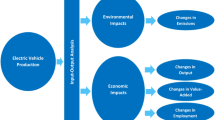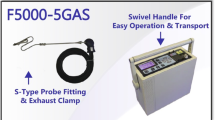Abstract
Purpose
In Korea, natural gas is widely used as city gas, fuel for electricity generation, and fuel for transportation (e.g., city bus). However, the environmental impact associated with the use of natural gas in Korea has not been paid much attention to. In this study, well-to-wheel (WTW) analysis on the greenhouse gas (GHG) emissions and energy uses associated with natural gas in Korea was performed by considering every step from feedstock recovery to final use in the vehicle operation.
Methods
The raw data used in the analysis were mainly provided by Korean natural gas industry and related associations. The additional information, especially for the processes in foreign countries, was also collected by literature survey. We adopted the GREET (Greenhouse Gases, Regulated Emissions, and Energy Use in Transportation) model as a base WTW analysis tool, which was developed by the U.S. Argonne National Laboratory. However, the WTW analysis on natural gas in Korea is far different from that of the U.S, because ~99 % of natural gas used in Korea is imported from the oversea countries in the form of liquefied natural gas (LNG). For this reason, detailed parameters in GREET were changed for Korean situation, and especially, significant modifications were made on liquefaction, LNG transportation and storage, and re-gasification processes.
Results and discussion
As a result of the analysis, the well-to-pump GHG emissions of city gas and compressed natural gas are calculated as 25,717–30,178 and 28,903–33,422 g CO2 eq./GJFianl_fuel, respectively. The WTW GHG emission of compressed-natural-gas-fueled city bus is calculated as 1,348–1,417 g CO2 eq./km. These values are relatively larger than those of the U.S., because most of the natural gas used in the U.S. is transported by pipeline in a gaseous state, which typically takes less energy and associated GHG emissions, as compared to the import of LNG in Korea. Finally, sensitivity analysis is performed on the parameters, which have either range of values among various sources or uncertainties due to lack of accurate information.
Conclusions
The results show that further investigation on three parameters, i.e., CO2 venting during natural gas processing, CH4 leakage in Korea, and CH4 leakage during recovery process, would be helpful to further improve overall accuracy of the analysis.






Similar content being viewed by others
Notes
Greenhouse Gases, Regulated Emissions, and Energy Use in Transportation.
AP-X is a trademark of Air Products and Chemicals Inc. The AP-X technology was developed to improve the maximum capacity over the C3MR technology by adding a nitrogen gas expander cycle.
The dry weight of the city bus in the report is 11 tons, and the maximum power is 220 kW at 2,000 rpm with an engine displacement volume of 11 l.
References
ANL (2012) GREET1 (Greenhouse Gases, Regulated Emissions, and Energy Use in Transportation) transportation fuel cycle analysis model Version 2012 rev2. Argonne National Laboratory. http://greet.es.anl.gov. Accessed September 2013
Bosma P, Nagelvoort RK (2009) liquefaction technology; developments through history annual gas processing symposium 1. http://www.nt.ntnu.no/users/skoge/prost/proceedings/gas-processing-doha-2009/fscommand/p03.pdf. Accessed September 2013
Burnham A, Han J, Clark CE, Wang M, Dunn JB, Palou-Rivera I (2011) Life-cycle greenhouse gas emissions of shale gas, natural gas, coal, and petroleum: supporting information. Environ Sci Technol 46:619–627, http://pubs.acs.org/doi/suppl/10.1021/es201942m. Accessed September 2013
Curran MA (2013) Assessing environmental impacts of biofuels using lifecycle-based approaches. Manage Environ Qual. http://www.emeraldinsight.com/journals.htm?articleid=17069226&show=abstract. Accessed September 2013
Edwards R, Larive JF, Beziat JD (2011a) Well-to-wheels analysis of future automotive fuels and powertrains in the European Context – Well-to-Wheels Report Version 3c. http://iet.jrc.ec.europa.eu/about-jec/downloads. Accessed September 2013
Edwards R, Larive JF, Beziat JD (2011b) Well-to-wheels analysis of future automotive fuels and powertrains in the European Context – WTT Appendix 2. http://iet.jrc.ec.europa.eu/about-jec/downloads. Accessed September 2013
EII (1994) Energy utilization and greenhouse gas emissions: end-use analysis. Energy International, Inc
He D, Wang M (2000) Contribution feedstock and fuel transportation to total fuel-cycle energy use and emissions. SAE
IGU (2012) World LNG Report 2011. International Gas Union. http://www.igu.org/gas-knowhow/publications/igu-publications/LNG%20Report%202011.pdf. Accessed September 2013
IPCC (2006) 2006 IPCC Guidelines for National Greenhouse Gas Inventories. Intergovernmental Panel on Climate Change. http://www.ipcc-nggip.iges.or.jp/public/2006gl/. Accessed September 2013
KEI (2012) Feasibility research on the CNG bus in Korea. Korea Environment Institute
KLCI (2013) Korea LCI Database Information Network. http://www.edp.or.kr/lcidb/main/main.asp. Accessed September 2013
NOAA National Geophysical Data Center (2010) Global Gas Flaring Country Data. National Oceanic and Atmospheric Administration
Pasquier R, Berthon C (2012) Model Scale Test vs. Full Scale Measurement: finding from the Full Scale Measurement of Sloshing project. http://www.gtt.fr/wp-content/uploads/2012/09/2012-isope-model-scale-test-vs-full-scale-measurement-2012-05-23.pdf. Accessed September 2013
(S&T)2 Consultants (2012) GHGenius transportation fuels lifecycle assessment model Version 4.02a. http://www.ghgenius.ca/. Accessed September 2013
TMC and MHIR (2004) Well-to-Wheel Analysis of Greenhouse Gas Emissions of Automotive Fuels in the Japanese Context. Toyota Motor Corporation and Mizuho Information & Research Institute. http://www.mizuho-ir.co.jp/english/knowledge/report/pdf/wtwghg041130.pdf. Accessed September 2013
U.S. EIA (2010) International Energy Statistics. U.S. Energy Information Administration. http://www.eia.gov/cfapps/ipdbproject/iedindex3.cfm. Accessed September 2013
U.S. EPA (1998) Commercial Maritime Emission Inventory for EPA Category 2 and 3 Compression-Ignition Marine Engines in the United States Continental and Inland Waterways. U.S. Environmental Protection Agency
U.S. EPA (2000) Analysis of commercial marine vessels emissions and fuel consumption data, EPA420-R-00-002. U.S. Environmental Protection Agency
Vink KJ, Nagelvoort RK (1998) Comparison of Baseload Liquefaction Process. http://www.ivt.ntnu.no/ept/fag/tep4215/innhold/LNG%20Conferences/1998/Papers/3-6-Vink.PDF. Accessed September 2013
Voyage Calculator (2013). http://sea-distances.com/. Accessed September 2013
Wie Y, Yoon S, Hun K (2001) Life cycle inventory analysis of LNG (Korea and Japan). Korean J LCA
Acknowledgments
We are grateful for the support provided by Korea Gas Corporation (KOGAS) and Korea Association for Natural Gas Vehicles (KANGV), and the financial support from the Korea Ministry of Environment Auto-Oil program (Project No. 0420-20120019) through the Seoul National University Institute of Advanced Machinery and Design (IAMD). We also thank Dr. Jungwoo Han in the U.S. Argonne National Laboratory for his advice and support.
Author information
Authors and Affiliations
Corresponding author
Additional information
Responsible editor: Hans-Jörg Althaus
Rights and permissions
About this article
Cite this article
Choi, W., Song, H.H. Well-to-wheel analysis on greenhouse gas emission and energy use with natural gas in Korea. Int J Life Cycle Assess 19, 850–860 (2014). https://doi.org/10.1007/s11367-014-0704-7
Received:
Accepted:
Published:
Issue Date:
DOI: https://doi.org/10.1007/s11367-014-0704-7




